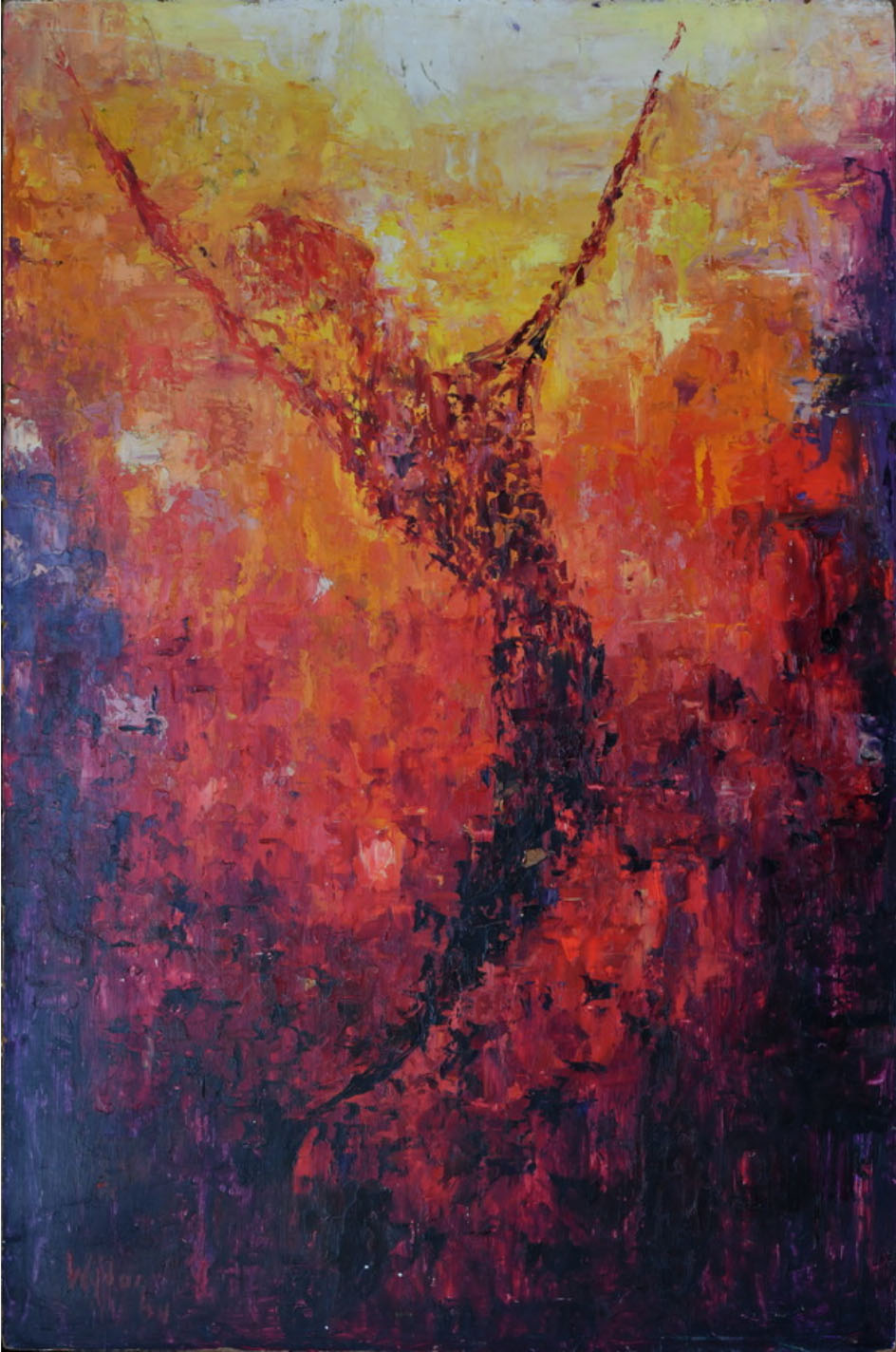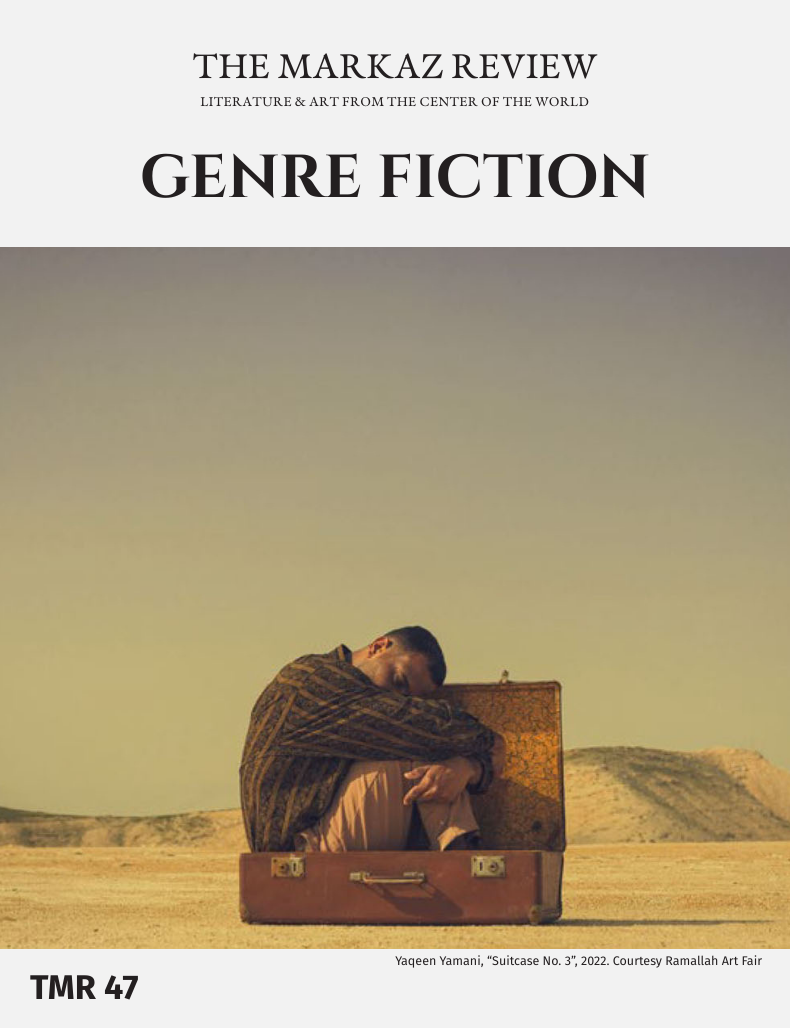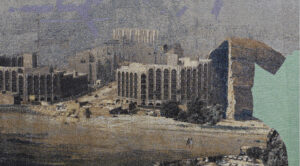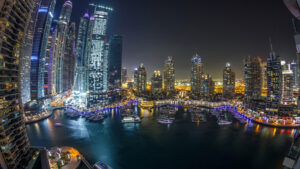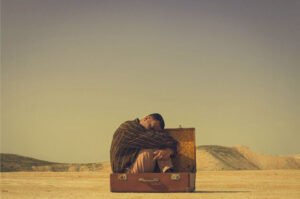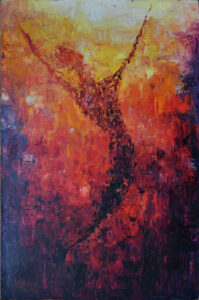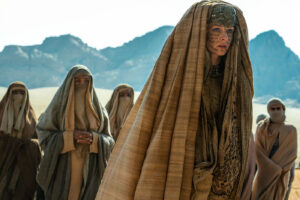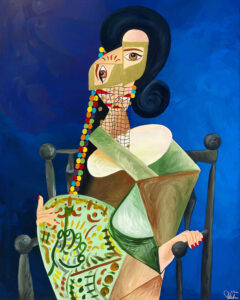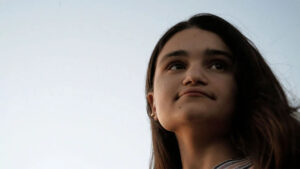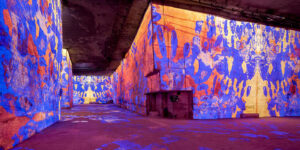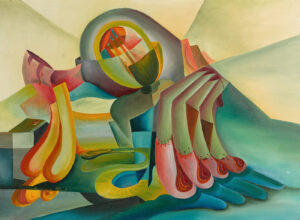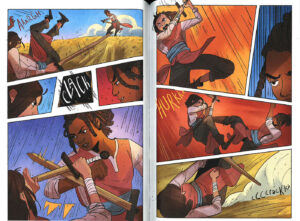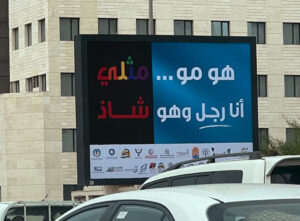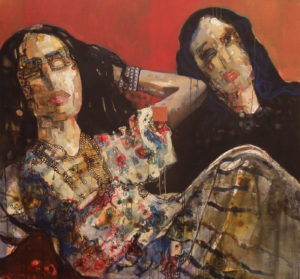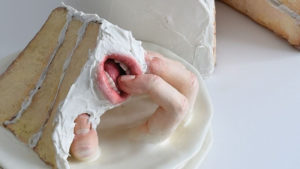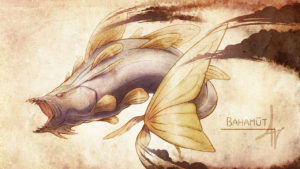A joyous celebration quickly spirals into a lifetime of trauma when an unforeseen "head" makes a shocking appearance at the gathering, turning laughter and merriment into a haunting memory.
I only remember certain things about that day. I don’t recall the weather or the politics of the region. Was there a looming bellicose tension, a war here or there? Who knows? What I recall is my father, Baba, returning home one afternoon with a lamb in the trunk of his car.
I was in the courtyard of our apartment complex in the khaliji city of Kuwait, hanging out with the usual neighborhood clique: Ahmad, Samer, and Maha. We were sons of Jordanian, Palestinian, and Lebanese expats who had traveled to the oil-rich Persian Gulf in search of a better life. We were Arab Christians and Muslims, neighbors and friends who formed a tight-knit community, a new family away from home. Our network exchanged Levantine recipes, shared anecdotes about our lives back home, traded war stories, and reminisced about simpler times.
We were playing football, with me proudly positioned as the goalkeeper, when my father parked his white Fiat in front of our red-brick four-story apartment complex, pulled a live lamb from the trunk, and placed it on the sidewalk in front of our building.
Naturally, I, along with my neighborhood comrades, dropped everything we held dear at that moment and ran to where my father was standing to glance at his latest possession.
Baba indulged us, looking appeased by our sudden curiosity. We cautiously made our moves. We observed the lamb from a distance, then approached it, taking turns as we caressed its curly coat.
“He’s so cute,” Maha shrieked as she petted its back.
The lamb looked like a tiny, fluffy pillow. Its little face had big, shiny eyes. Its legs were so skinny and shaky, and we all giggled in unison the first time it spoke, making a baa noise. I remember the feel of the lamb’s fur on my hands, so soft and warm, like a delicate cloud in my palms.
Ahmad clapped his hands loudly, trying to see its reaction.
“Stop it. You’re scaring him,” scolded Samer.
The lamb trembled slightly, its soft, dusty scent filling the air as it looked at us with its big, glassy eyes.
Baba left us to our own devices, stepped back, put his hand in the side pocket of his long-striped brown suit, and pulled a pack of local brand cigarettes. He inhaled while watching us marvel at the new beast on the block.
After a prolonged period of us pampering our new neighborhood arrival, Baba interrupted our play and informed us it was time to escort the lamb to its new home: the roof of our Kuwait City apartment building.
We accompanied the lamb on its journey up. After tying the lamb to a pole attached to one of the water tanks on the roof, Baba declared that he was putting us in charge of feeding the lamb.
“What shall we feed it?” asked Ahmad anxiously.
“Grass, of course,” said Baba.
Suddenly, our life had a new meaning, a purpose. Just like that, we became the animal feeders, its caretakers.
“Let’s call him Zeezo,” said Ahmad.
“How do you know it’s a boy?” I asked.
“I just know,” he giggled.
Life was no longer the same after we were head-hunted by Baba. Every day, right after the school bus dropped me off in front of our apartment building, I would jump out of the vehicle, get inside the complex, and run the stairs, climbing four floors all the way up to the roof to greet the lamb, feed it whatever I could and tell it about my day. I remember giving it cucumbers, some lettuce, and maybe some bread.
I mentioned my French teacher to my new pet and narrated one incident in which she tossed me out of class for failing to conjugate one of the primary verbs in the French language.
I also told him that one of the supervising nuns at school gave me a hard slap on the face after I showed up in school one day wearing red-dotted socks instead of the required all-black ones. I told him that there was this boy in my class who touched me somewhere he was not supposed to touch me, in my eib, my shame area. The lamb listened. The rest of the squad did precisely the same.
I heard Maha tell Zeezo that her dad whipped her with his belt every time she got a bad grade at school and that she deserved it for not studying hard. I also heard Ahmad tell him that he planned to prank his big brother later that day, while Samer mostly stayed quiet as he fed Zeezo. Feeding the lamb while telling him tales became a daily routine for the neighborhood kids.
One morning, I woke up before everyone else and headed straight to the kitchen. I might have needed something to occupy myself with while my siblings were still asleep. I opened the fridge, not knowing that at this very moment, I was about to usher in a childhood tale that, two decades later, would be told repeatedly to an attentive audience over alcohol, usually, lots of alcohol.
When I opened the fridge, my eyes fell on something in the middle of the upper shelf, nestled between the pita bread and a dozen stuffed grape leaves. I blinked. Once. Twice. My hands were still on the fridge door, gripping it tightly as I leaned forward.
There it was. The head of my lamb.
My pet, the one I had fed every day. Its eyes — those same shiny, curious eyes that once made me laugh — were now glassy and still, its mouth slightly open as if caught mid-blink. The head of the lamb that had listened to my stories, my secrets, now sat beside bread and mezze.
My chest tightened. I rubbed my eyes again and again, hoping — praying — that I was wrong, that this was some kind of mistake, or maybe a nightmare, maybe I was still asleep. But there it was. A wave of nausea hit me, and I stumbled back, slamming the fridge door shut with a force that rattled the shelves. I shrieked, then shrieked again.
I felt dizzy, my head spinning. I pressed my back against the fridge, my breathing shallow. Was this really happening? I glanced around, half-expecting someone —my mother or father — to appear to explain why the lamb’s head, my lamb’s head, was now in our fridge like it belonged there. But the house was still. No one had heard my shrieks. No one was coming.
My throat felt so dry, and I found it hard to breathe. With my shaking hands, I reopened the fridge. I looked again at the upper shelf, giving my pet’s head a more focused stare. I must have lost track of time as after staring at the lamb’s face for what felt like hours, I heard footsteps coming from my parents’ bedroom.
I quickly shut the fridge door for the last time that day and rushed to my room. I got out my elementary school uniform from the oak closet I shared with my two sisters. I put it on silently while two tear drops rolled down my cheeks, leaving wet marks on my grey jumper.
I received an education that day.
I never mentioned anything about that morning’s discovery to my friends or my sisters. I finished the school day with a deep knot in my stomach.
When I returned from school, I avoided my neighborhood friends and ran straight to our apartment. My parents were busy preparing for a big feast on the occasion of their 10th wedding anniversary. It was my father’s idea, a man of few words, who was secretly a hopeless romantic. The whole house smelled of cooked rice and spices (a blend of cinnamon, cardamom, and allspice).
My mom was a tornado in the kitchen, chopping vegetables for a salad and stirring the warm yogurt, jameed, for the main meal, mansaf — my country of birth’s national dish and source of pride. One of Jordan’s claims to fame.
“Go to the store now,” I heard her tell my dad frantically. “We’re out of fresh bread.”
When the guests started arriving, the table was already set. I quickly glanced knowing what I would find: my deceased pet as the guest of honor. The detached head with its open jaws was positioned atop a pile of Egyptian rice, surrounded by flat bread, nuts, and warm jameed.
My lamb was the centerpiece.
I pretended to eat mansaf that day, just like everyone else, but pushed the meat aside and chewed slowly.
“Why aren’t you eating any meat?” my mom asked, pointing at my plate. I shrugged.
The night was young. There were neighbors and friends. The women were on one side of the living room with their plates on their laps. Their kids were left home to work on their homework and play video games.
“He insisted on having this dinner tonight,” I heard my mother tell Maha’s mother.
“He said we need to celebrate his 10 years of life imprisonment.”
“With hard labor,” responded Maha’s mom.
Both the women laughed hysterically. I clenched my jaw and thanked God that my friends were not here to witness this calamity.
“The brain is the best part,” said Maha’s mom as she slowly nibbled on my lamb.
“You think?” My mom responded. “I think it’s the tongue.”
“Nah, it’s too chewy,” Maha’s mom countered. “I also enjoy the eyes. They’re perfect. Gelatinous, buttery, and they practically melt in your mouth.” She pressed her fingertips to her lips and pulled them away with a long chef’s kiss. “Exquisite.”
I felt bile rise from the pit of my stomach up to my throat.
The men were on the opposite corner of the table discussing politics. The men always discussed politics. They were sipping on anise-flavored liquor, araq.
I heard the men laugh after someone almost choked on the lamb’s testicles.
“These are really big balls,” one of the men blurted out.
Their araq-infused laughs filled the house.
My lamb, Zeezo, was never mentioned that night. No eulogies were uttered. No celebration of life was organized. He slowly melted away in the guests’ mouths. Gone forever.
I was 25 years old and was back at my parents’ apartment in Amman, Jordan, where they decided to settle after a prolonged working stint in the banking sector in Kuwait and Qatar.
I was working on my masters in political science in London, in Jordan for the Christmas break. It was only me and my father that night. Baba was drinking araq, and I was sipping on his homemade bitter wine. We were both in a fine mood. I do not know what happened that night, but it suddenly made me dig out the lamb story from its burial place. The alcohol, the joy of being back home, the holiday spirit. Who knows? It just reemerged.
“Baba,” I began, swirling the wine in my glass, “Do you remember the lamb you brought home that one time in Kuwait?”
He paused mid-sip, furrowing his brow. “The lamb?” His voice was distant.
I nodded. “Yeah, the one you put on the roof. We played with it for days, then… we had it for mansaf.”
“Ah, yes, that lamb. I remember now,” he chuckled, shaking his head. “You and the neighborhood kids used to feed him salami sandwiches,” he said with a grin.
“We did? I don’t remember that.” I laughed slightly, caught off guard.
He tilted his head: “Why bring it up after all this time?”
“I don’t know,” I shrugged, feeling a small knot in my chest. “It just… stayed with me. Where did you even get it from?”
Baba adjusted himself on the sofa, picked up a pack of French-brand cigarettes, pulled one roll, lit it, and inhaled. “It’s actually a nice story,” said Baba. “It was a gift. From a sheikh who was a good client of mine at the bank.
“I was sitting in my office at the bank one day when a local sheikh who happened to be a very good client barged into my office and handed me a sum of 5,000 dinars,” Baba said, then let out a puff of smoke.
“He said I deserved the money as I was his favorite person in this bank. Just like that, he gave me the money and left,” Baba said, looking contemplative.
He took another puff and continued. “I knew that the sheikh was drunk that day and was not acting rationally, so I called his brother, who also happened to be our client. I explained the situation and asked him to come to collect the money.” He let out a deep breath. “The brother came rushing to the bank, collected the money, thanked me, and left. The next day, he returned to the bank and asked me to come outside with him. I did, and there on the sidewalk was a lamb. He told me it was a thank-you gift for my honesty.”
“Wow, Baba, so that’s how it happened.” I kept silent for a few minutes and then let out a sarcastic laugh.
“What is it?” Baba asked, looking surprised.
“Do you know that I found the lamb’s head in the fridge one morning?” I said. “How come you never thought of it? He was practically my pet. It was traumatizing for me as a kid.” I felt my jaw tighten.
He pulled his head back, “It never crossed my mind, habibti. It’s our culture, our tradition. The lamb is the greatest gift we could receive. A feast. The head —” he gestured with his cigarette, “is a decoration, the highest honor during our meals.” He fudged in his seat. “Some even argue that the head has the best meat…the brain, the eyes.”
I raised my eyebrows. “Seriously, Baba, you never thought I might be upset for losing my pet, seeing all of you chew on his parts?”
He took another drag, his gaze distant. “I grew up differently,” he said quietly. “The lamb was always meant for the feast. It was tradition. It wasn’t meant to be kept, only consumed.” He sighed. “I didn’t think twice because, for me, that’s what a lamb always was. I’m sorry I didn’t see it through your eyes.”
I didn’t say anything more after that. I excused myself and went to bed, intoxicated by both the wine and troubled by my father’s version of the lamb story.
That night, I dreamed of my lamb, of Maha, Ahmad, Samer, and our days in Kuwait. Whatever happened to them? I strained to remember what they looked like. Maha was short and skinny, with curly hair. Samer was chubby, with a big mole on his cheek. Ahmad wore glasses, which he had broken at least twice and had had to tape with black tape to hold together.
In which part of the world were they now? Why did we never find each other on social media? Were we all trying to put that chapter of Kuwait days behind us?
I spent almost a month in Jordan that Christmas break. My relatives were thrilled to have me back, especially my aunts and uncles, who made sure to invite me over for mansaf, and I participated in their mansaf ceremonies on various occasions: weddings, engagement parties, the arrival of a newborn son (it’s always the son). Of course, I saw several lamb heads during those family events. They were all placed in their prime position on a pyramid of rice.
During one lunch thrown in my honor, I could not help but glance at the detached part proudly presented before the guests. “You’re not eating enough; come on, dig in,” my aunt Afaf said, interrupting my long stares.
“Auntie, I’m so full. You have no idea,” I said, rubbing my belly.
She waved me off, laughing. “This is mansaf! You can always eat more. Take some of the lamb. It’s the best part.”
I smiled. “Yes, it is,” I said, giving the head one more stare before refilling my plate, wondering if I’d ever truly outgrown the part of me that longed for a lamb of my own.



